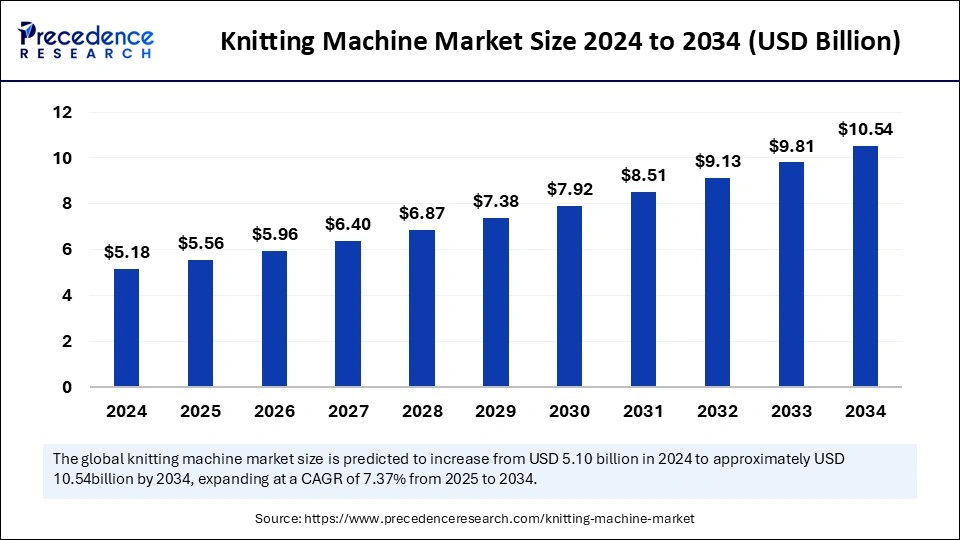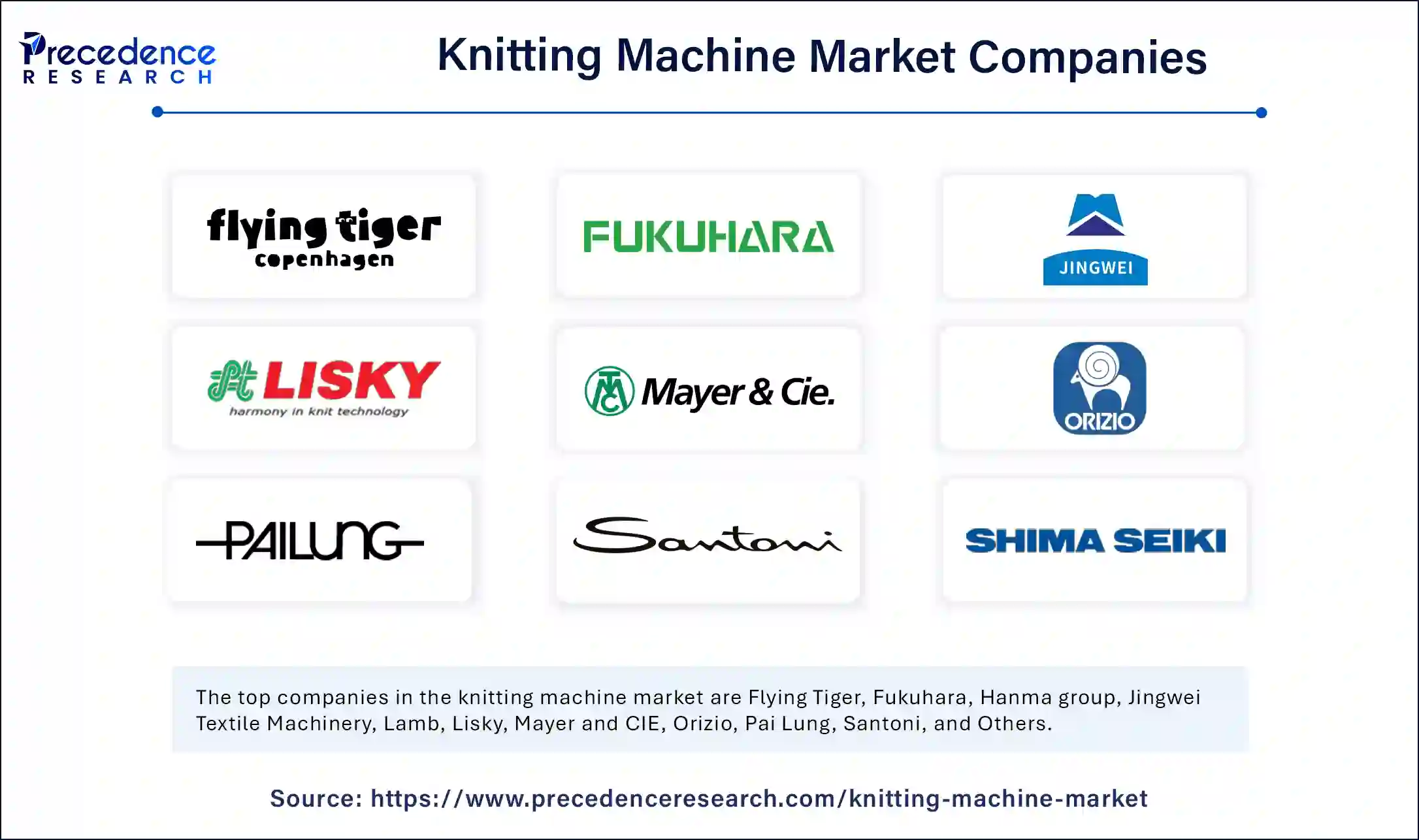The global knitting machine market size was valued at USD 5.18 billion in 2024 and is expected to attain around USD 10.54 billion by 2034, growing at a CAGR of 7.37%.

Knitting Machine Market Key Points
-
Asia Pacific was the market leader in 2024 with 41% share.
-
North America will see the strongest CAGR between 2025–2034.
-
By type, weft-knitting machines held the dominant position.
-
Warp-knitting machines will gain notable market traction.
-
Double-knit segment outperformed other knit types in 2024.
-
Single knit is set for a steady CAGR rise.
-
Fully automatic machines led market demand in 2024.
-
Semi-automatic variants are gaining momentum.
-
Apparel textiles were the top end-user in 2024.
-
Sports textile usage is expected to increase significantly.
-
Direct sales channels had the widest market reach.
-
Indirect sales channels are projected to grow quickly.
Role of AI in the Knitting Machine Market
Artificial Intelligence (AI) is revolutionizing the knitting machine market by enabling smart automation, real-time quality control, and predictive maintenance. AI-powered knitting machines can automatically adjust stitch density, fabric tension, and patterns with high precision, reducing human intervention and material waste. Sensors and data analytics allow for predictive maintenance, minimizing downtime and enhancing machine lifespan, while also ensuring consistent product quality by instantly detecting defects.
Additionally, AI supports customization and innovation in design by analyzing consumer trends and past production data. This allows manufacturers to create personalized patterns, switch between fabric types with ease, and respond faster to market demands. AI also improves energy efficiency and simplifies machine operation, making knitting processes more sustainable and user-friendly across fashion, sportswear, and industrial textile sectors.
Knitting Machine Market Growth Factors
-
Rising Demand for Apparel & Fashion Wear
The growing global population, fast fashion trends, and increased consumer spending on clothing are boosting the demand for high-volume textile production, propelling the adoption of advanced knitting machines. -
Technological Advancements
Innovations such as computer-controlled knitting systems, AI integration, and automation are enhancing precision, speed, and customization capabilities, making knitting machines more efficient and appealing to manufacturers. -
Growth of the Sportswear and Activewear Segment
The rising health and fitness awareness has fueled demand for functional and comfortable sports textiles, leading to higher demand for machines that can produce stretchable, breathable, and durable fabrics. -
Increasing Textile Manufacturing in Emerging Economies
Countries like China, India, Bangladesh, and Vietnam are investing heavily in textile manufacturing infrastructure, creating substantial opportunities for knitting machine vendors. -
Customization and Mass Personalization
The ability of modern knitting machines to produce intricate and personalized designs is attracting manufacturers aiming to meet diverse consumer preferences and market niches. -
Sustainable and Eco-Friendly Production Trends
Knitting machines are increasingly being used in sustainable textile production due to their low waste output and energy-efficient operations, aligning with the industry’s push toward eco-conscious manufacturing.
Market Scope
| Report Coverage | Details |
| Market Size by 2034 | USD 10.54 Billion |
| Market Size in 2025 | USD 5.56 Billion |
| Market Size in 2024 | USD 5.18 Billion |
| Market Growth Rate from 2025 to 2034 | CAGR of 7.37% |
| Dominated Region | Asia Pacific |
| Fastest Growing Market | North America |
| Base Year | 2024 |
| Forecast Period | 2025 to 2034 |
| Segments Covered | Type, Knit Type, End Use, Mode Of Operation, Distribution Channel, and Regions |
| Regions Covered | North America, Europe, Asia-Pacific, Latin America and Middle East & Africa |
Market Dynamics
Market Drivers
Several factors are fueling the growth of the knitting machine market. The increasing demand for apparel due to fast fashion trends, population growth, and urbanization is a primary driver. In addition, manufacturers are shifting towards advanced knitting machines that enable faster production cycles and minimal labor dependency. Technological innovations, such as computer-aided design (CAD) systems and seamless knitting technologies, are also pushing market adoption forward. Furthermore, growing health awareness has sparked increased consumption of activewear and sports textiles, boosting demand for machines capable of creating high-performance fabrics.
Opportunities
The knitting machine market is ripe with opportunities, especially in emerging markets across Asia-Pacific and Africa where textile production is booming. The trend toward personalized and custom-made clothing is also encouraging manufacturers to adopt versatile machines that support on-demand production. Additionally, sustainability has become a key focus, prompting the development of eco-friendly knitting solutions that reduce fabric waste and energy consumption. Innovations in smart textiles and wearable technology present new avenues for product diversification and market expansion.
Challenges
Despite strong growth potential, the knitting machine market faces certain challenges. High initial capital investment and maintenance costs can deter small and medium-sized manufacturers from adopting advanced machines. Additionally, the need for skilled labor to operate sophisticated machines remains a concern in developing regions. Market players must also adapt to rapidly changing consumer preferences and technological standards, which require continuous R&D and strategic agility.
Regional Insights
Asia Pacific dominates the global knitting machine market, holding the largest share in 2024 due to strong textile manufacturing bases in countries like China, India, and Bangladesh. The region benefits from cost-effective labor, favorable government policies, and rising domestic demand for apparel. North America is projected to grow at the fastest CAGR from 2025 to 2034, driven by automation trends and a strong emphasis on sports and functional wear. Europe remains a steady market, with countries like Germany and Italy leading in technological innovation and sustainable textile manufacturing practices.
Knitting Machine Market Companies

- Flying Tiger
- Fukuhara
- Hanma group
- Jingwei Textile Machinery
- Lamb
- Lisky
- Mayer and CIE
- Orizio
- Pai Lung
- Santoni
- Shima Seiki
- Stoll
- Tompkins
- Yamato Sewing Machine
- Zentex
Leaders Announcement
- In February 2025, TotalEnergies and Mayer and Cie announced a partnership to co-brand the Tixo Stainless knitting machine oil range. Signed on February 6, 2025, the agreement combines TotalEnergies’ high-performance lubricants with Mayer and Cie’s advanced knitting machines to enhance efficiency and durability in textile production.
Recent Developments
- In January 2025, seamless knitting machine specialist Santoni partnered with UK-based Vickers to develop a needle lubricant solution for its flagship large-diameter knitting technology, enhancing performance and efficiency.
In November 2024, A.T.E., a leading Indian textile engineering company, and UNITEX Singapore announced a partnership to promote knitting machines in India. This collaboration leverages their combined expertise to expand the adoption of advanced knitting technology in the Indian textile sector.
Segments Covered in the Report
By Type
- Warp knitting machines
- Raschel warp
- Tricot warp
- Others (crochet, etc.)
- Weft knitting machines
- Circular
- Straight bar
- Others (loop wheel, etc.)
By Knit Type
- Single knit
- Double knit
By Mode of Operation
- Manual
- Semi-automatic
- Fully automatic
By End Use
- Automotive textiles
- Sports textiles
- Apparel textiles
- Home textiles
- Others (footwear industry, etc.)
By Distribution Channel
- Direct sales
- Indirect sales
By Geography
- North America
- Europe
- Asia Pacific
- Latin America
- Middle East and Africa
Also Read: Embroidery Machine Market
Ready for more? Dive into the full experience on our website@ https://www.precedenceresearch.com/
- Singapore Interactive Kiosk Market Size to Attain USD 1,835.92 Billion by 2034 - April 17, 2025
- Robotic Sensors Market Size to Attain USD 1,716.86 Million by 2034 - April 17, 2025
- Laminated Steel Market Size to Reach USD 2.63 Billion by 2034 - April 17, 2025
